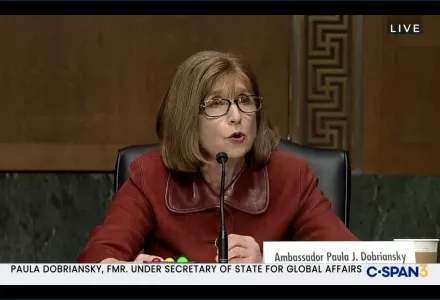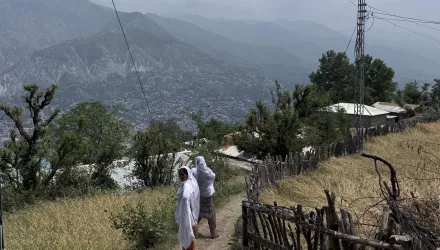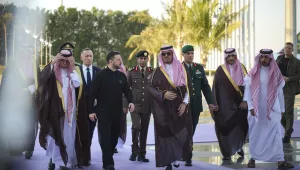
Chairman Menendez, Ranking Member Risch, and other distinguished members of this Committee, good morning and thank you for inviting me to appear before you today to discuss a topic of great importance to the United States and to our allies. This hearing is timely and welcome.
Great power competition defines the current international environment and shapes the prospects for democracy development. China and Russia are seeking to diminish American power and influence, fragment our alliances, and undermine other U.S. national security interests. We can expect strategic competition with Beijing and Moscow to continue and even intensify. How to deal with these threats should be a central focus of U.S. foreign policy going forward. Defending democracy and universal freedoms must be a key element of U.S. strategy.
Speaking at the Munich Security Conference in 2007, Russian President Vladimir Putin warned of a new era of confrontation with the West, asserting Russia’s prerogative to “carry out an independent foreign policy.” He asserted that Western values are not Russian values. And despite over two decades of efforts to incentivize China to be a “responsible stakeholder,” its leaders continue to pursue aggressive regional and global behavior, to violate international trade norms and standards, and to commit egregious human rights abuses against its own people, including Tibetans and Uighurs. As I speak today, Beijing is tearing up the 1984 Sino-British Joint Declaration and stripping away Hong Kong’s democracy.
China and Russia have also become increasingly aligned, even though they have not established a formal alliance. As Steve Hadley and I wrote in an Atlantic Council Insights Memo, “Russian and Chinese leaders share an authoritarian ideological orientation and perceive American power and democratic values as a threat.” They are working together more closely to undermine American influence and discredit our political, economic and social system.
In Latin America, Africa, Europe and the Middle East, China and Russia have used proxies, economic instruments, disinformation campaigns, election interference, corrupt relationships, energy resources, and soft power to subvert both fragile and well-established democratic governments and thus to foment instability. They have engaged Iran, Venezuela and Cuba in these anti-American efforts.
Venezuela is a flashpoint for Chinese and Russian investment and malign influence. Both nations have invested billions into Venezuela taking advantage of its economic and political weakness, its vast petroleum resources, and their close relationships with the corrupt Maduro regime. Russia’s state oil firm, Rosneft imported 503,000 barrels per day of oil in 2019, 62% of Venezuela’s total oil exports that year. Russian arms manufacturers sold $4 billion worth of weapons to Venezuela over the last 10 years. And China has invested $67 billion in Venezuela since 2007. These investments have propped up an illegitimate government and have undermined prospects for democracy. Iran and Venezuela have cooperated to bypass damaging U.S. sanctions on both their countries. Iran has also sent ships to Venezuela loaded with gasoline and petroleum refining equipment, technical experts and supplies.
But it doesn’t stop there. Russian disinformation and election interference campaigns have targeted Colombia. In late 2019, Colombian Vice President Marta Lucia Ramirez accused Russia and its allies in Venezuela of fomenting protests through social media campaigns. A few months later, New York Times journalist Lara Jakes reported on a State Department assessment that described Russian-linked social media accounts as conducting “an influence campaign.” The campaign had been underway not only in Colombia, but elsewhere in South America, including Chile, Bolivia and Ecuador. By undermining democracies in the region, Russia and China seek to create instability in our backyard.
Russia and China have expanded investments in Africa as well. In 2003, annual Chinese foreign direct investment in Africa was just $75 million. By 2019, it reached $2.7 billion. Through its One Belt One Road Initiative, China is offering fragile democracies in Africa new rail lines, highways, and other infrastructure projects. African nations are finding that these projects have left them with massive debt and a lack of control. Russia is increasing its investments in Africa too, especially its military presence, by sending mercenaries to Mozambique, Libya, and the Central African Republic. Moscow is striving to create a Red Sea naval logistics facility in Sudan too.
China and Russia are waging a fierce battle against democracy through disinformation campaigns, cyber intrusions, investment, and attacks on Western values. China’s substantial economic, financial and technological leverage constrains how many countries can respond to this, in Europe, the Middle East, and elsewhere.
Defending and promoting democracy and human rights abroad is not only a moral imperative but also a sound strategic approach. What are the most effective means of achieving this core objective? There are several:
- a strong military and economic foundation at home,
- working closely with our allies and other nations to advance a coherent, compelling moral narrative about democracy and Western values,
- overcoming others’ complacency to secure their support in challenging the falsehoods put forth by Moscow and Beijing,
- countering influence operations in social media and exposing them for what they are,
- providing fragile democracies with humanitarian assistance through USAID as well as democracy support through institutions such as NED, IRI, NDI, the Development Finance Corporation, and Eximbank,
- imposing targeted sanctions against specific activities (such as Russia’s energy investments in Venezuela), and
- sanctioning government officials or others responsible for corruption and human rights violations through the Global Magnitsky Act of 2016, including asset freezes, travel bans and exclusion from financial services.
I have strongly advocated for the use of Global Magnitsky against Cuban officials and their accomplices, who have committed gross violations of human rights, including modern day slavery by trafficking of doctors, worked to destabilize democracies in the Western Hemisphere and collaborated with China, Iran, and Russia. Significantly, in January 2021, Treasury’s Office of Foreign Assets designated the Cuban Ministry of Interior and the first Cuban official, the Minister of Interior, Lazaro Alberto Alvarez Casas, for serious human rights abuses against Jose Daniel Ferrer held in a Ministry of Interior-controlled prison.
Ronald Reagan advanced a foreign policy predicated on U.S. global leadership, military strength and moral clarity. We bolstered our ties to democratic allies, challenged regimes hostile to our interests and values, and promoted political and economic freedom abroad. This strategic approach advanced both U.S. interests and global freedom. It was successful then and can be successful today.
Madeleine Albright, former secretary of state under the Clinton administration, joined a former State Department official and activists from South Sudan, Burma and Hong Kong for a discussion with lawmakers on democracy. She and the others spoke about the U.S. role in promoting democracy abroad, the threats posed by China and Russia, and the state of other democracies around the world.
Dobriansky, Paula J.. “Testimony before the Senate Foreign Relations Committee.” United States Senate, March 10, 2021
The full text of this publication is available via United States Senate.




